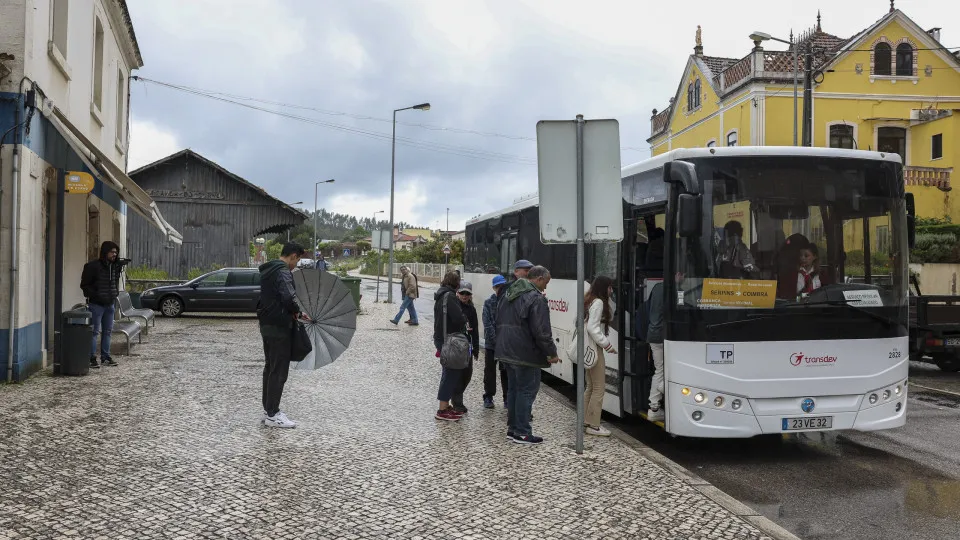Temporary solution on the Ramal da Lousã has been going on for 15 years
Alternative transport to the old railway service between Coimbra, Miranda do Corvo and Lousã, created as a temporary solution, have already lasted for almost 15 years and have created several inconveniences for the life of the users.

© Lusa

País Lousã
Pedro Curvelo, who often uses the alternative service, told Lusa that "it has been 15 years of suffering", especially for citizens who use the buses every day, between Coimbra and Serpins, in the municipality of Lousã.
"For these people, the prospect of opening a new transport system - modern, they say - is good news", he acknowledged.
However, "what is coming may not meet their real needs", especially in the suburban section of the old Ramal da Lousã, he said.
"It will be a great solution for the city of Coimbra", added the civil engineer.
In 2014, Pedro Curvelo was one of the founders of the Lousã pelo Ramal movement, which, as opposed to the light surface metro, advocated the electrification and modernisation of the century-old railway, maintaining the connection to the Linha do Norte, at Coimbra B station.
"For those who live in Serpins, Lousã or Miranda do Corvo, I doubt that this Metrobus solution will be good, with optical guidance in tunnels and bridges", he stated.
The former PSD councillor at the Lousã City Council stressed that the Metrobus electric bus "can only run at 30 km per hour in tunnels and bridges, which are many" between Miranda and Alto do São João, in the district capital.
In the old railway channel, journeys "may be longer", as it is a "slower" system than in the time of the 'Allan' railcars, of Dutch origin, which ran on the line until January 2010.
"If we want a modern solution, we also have to be faster and that will certainly not happen" in the future, with the entry into operation of the Sistema de Mobilidade do Mondego (SMM), he criticised.
In the past, "there was a deficient operation of the system" by CP, acknowledged Pedro Curvelo, 64, recalling the time when he was a student at the University, when "the train only took 30 minutes" to travel between Lousã station and São José station, in Coimbra.
"I have used the alternative transport and the buses go around the curves, the journey is torture", he lamented.
José Soares Gonçalves, 83, a resident of Lousã, likes to go to Coimbra on alternative transport, to walk with his wife, to go shopping or for health reasons.
"I liked the railcars", but the current buses "are comfortable", said the retiree, who plans to "travel even more often" on the future Metrobus.
The user Mário Sol, 68, emphasised to Lusa that "the safety of trains is not comparable" to that of electric buses that will run on the asphalt of the old Ramal da Lousã.
Mário Sol is a member of the Miranda do Corvo Parish Council, for the CDU, and about 20 years ago he was involved in the foundation of the Movimento de Defesa do Ramal da Lousã, which contested the metro process and defended the electrification of the line.
In his opinion, alternative transport has been "a very bad experience for most of the people who have used it to date".
On the other hand, "they are disappointed" with the closure of the railway connection, almost 15 years ago, and its replacement by the bus system with rechargeable batteries.
Gracinda Dias Mendes, 70, a resident of Moinhos, Miranda do Corvo, was pleased to be "still from the time of the steam train", which ran "completely full of people".
She said that, in the early days of alternative transport, in 2009, "people started to get scared" and some "started to drive" to Coimbra.
"There were delays and it was always this confusion. In many cases, it even rained on the buses", she recalled, stating that, in recent years, "there have been no major problems".
Gracinda Mendes confirmed to Lusa that the dragging out of the metro process, including the abandonment of the works in 2011, led "many people" to sell their houses and leave the municipalities of Miranda and Lousã.
Read Also: Carris Metropolitana registers fewer complaints in the 1st quarter of this year (Portuguese version)


Descarregue a nossa App gratuita.
Oitavo ano consecutivo Escolha do Consumidor para Imprensa Online e eleito o produto do ano 2024.
* Estudo da e Netsonda, nov. e dez. 2023 produtodoano- pt.com



